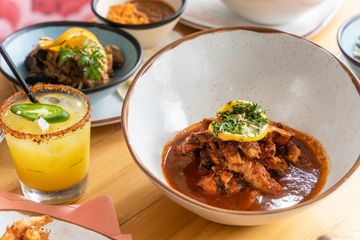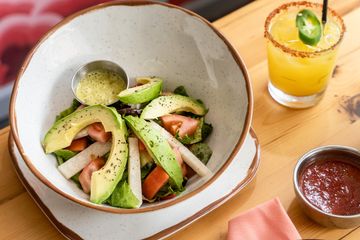Explore tacos filled with authentic spices for every meal
Wiki Article
Is Mexican Food Healthy? Unboxing the Nutritional Advantages of Conventional Active Ingredients
The concern of whether Mexican food is healthy and balanced welcomes an expedition of its conventional components. Beans and corn work as foundational staples, rich in protein and fiber. Avocados offer valuable fats, while different herbs and seasonings add flavor and health and wellness advantages - best mexican westchester NY. Together, these components produce a tapestry of nutrition. The healthfulness of Mexican cuisine frequently depends on prep work approaches and section dimensions. What function do these factors play in identifying its overall dietary value?The Power of Beans: Protein and Fiber-Rich Staples
Typically neglected, beans offer as a foundation of Mexican food, providing a wide range of dietary benefits. Rich in healthy protein, they are an outstanding plant-based option for those seeking to meet their nutritional protein needs. This high healthy protein material supports muscular tissue repair service and growth, making beans important for both vegetarians and meat-eaters alike. In addition, beans are an exceptional resource of nutritional fiber, which aids in digestion and advertises a sensation of fullness, potentially helping with weight management.The range of beans made use of in Mexican recipes, such as black beans, pinto beans, and kidney beans, contributes to a varied flavor profile and can improve dishes nutritionally. Additionally, beans are reduced in fat and have vital vitamins and minerals, including magnesium, folate, and iron. With each other, these characteristics make beans a critical ingredient, delivering both nourishment and nourishment in typical Mexican fare.

Corn: a Versatile Grain With Nutritional Benefits
Corn stands apart as a flexible grain fundamental to Mexican cuisine, commemorated not only for its cooking applications but likewise for its excellent nutritional account. As a main active ingredient in recipes like tortillas, tamales, and pozole, corn supplies important nutrients that add to a balanced diet regimen. Rich in carbohydrates, it functions as a considerable energy source, while additionally being reduced in fat, making it a positive alternative for numerous nutritional demands.Corn is an excellent source of nutritional fiber, which aids in food digestion and promotes satiation. It includes considerable amounts of vitamins such as B-complex vitamins, which are necessary for power metabolic rate. The existence of antioxidants, specifically carotenoids, adds to overall health and wellness by decreasing oxidative stress. Furthermore, corn is gluten-free, accommodating those with gluten sensitivities. Generally, the dietary advantages of corn highlight its value in standard Mexican food and its function in a healthy diet plan.
Avocados: Healthy And Balanced Fats and Nutrients in Every Bite
Avocados play a substantial role in Mexican food, complementing recipes with their velvety structure and rich taste. Beyond their culinary appeal, avocados are commemorated for their outstanding nutritional account. They are an abundant source of healthy monounsaturated fats, which can help lower bad cholesterol levels and support heart health and wellness. In addition, avocados are loaded with crucial vitamins and minerals, consisting of potassium, vitamin E, and B vitamins, contributing to total wellness.The high fiber web content in avocados aids food digestion and advertises satiety, making them a helpful addition to any meal. Their one-of-a-kind nutrient structure can additionally support skin health and give anti-inflammatory advantages. Incorporating avocados right into conventional Mexican meals or enjoying them as a standalone snack can enhance both taste and nutrition, showing why they are a cherished staple in Mexican food. In general, avocados supply a scrumptious means to take pleasure in healthy and balanced fats and important nutrients in every bite.

Natural Herbs and seasonings: Flavorful Health And Wellness Boosters
While appreciating the abundant tastes of Mexican food, one can not forget the necessary duty that spices and natural herbs play in enhancing both taste and health. Components such as chili, cilantro, and oregano peppers not just add to the vivid flavor profile but likewise offer considerable health benefits. For instance, happy hour cilantro is known for its detoxifying residential or commercial properties, assisting to get rid of heavy metals from the body, while oregano is loaded with antioxidants and has anti-inflammatory effects.Chili peppers, a staple in many Mexican dishes, consist of capsaicin, which has been linked to enhanced metabolism and pain relief. Additionally, spices like cumin and coriander assistance food digestion and might aid in blood sugar level policy. Including these flavorful health and wellness boosters right into meals not just boosts the cooking experience but also advertises overall well-being, making Mexican food not simply delicious, yet likewise nutritionally beneficial.
Typical Food Preparation Approaches: Enhancing Nutrition and Flavor
Traditional cooking techniques in Mexican food play a necessary duty in improving both nutrition and flavor, as they typically focus on classic techniques and fresh ingredients. Strategies such as nixtamalization, where corn is soaked and prepared in an alkaline option, not just improve the nutrient account of tortillas however also enhance their digestibility - best mexican westchester NY. Furthermore, using sluggish cooking approaches, like cooking or braising, enables tastes to blend wonderfully while maintaining the stability of the ingredients
Often Asked Inquiries
Are Mexican Food Portions Typically Larger Than Other Cuisines?
Mexican food sections are commonly larger than those of several various other cuisines. This characteristic reflects conventional eating practices, highlighting public sharing and hearty dishes, which can result in a more substantial serving dimension on the whole.
Exactly how Does the Preparation Technique Affect Healthfulness of Mexican Food?
Prep work techniques substantially influence the healthiness of Mexican food. Methods such as grilling or steaming protect nutrients, while frying can enhance undesirable fat web content. Choices of components and cooking designs ultimately identify general nutritional worth.Can Mexican Food Be Tailored for Specific Dietary Constraints?
Mexican food can undoubtedly be customized for specific nutritional limitations. Replacements, such as utilizing corn tortillas for gluten-free diet regimens or incorporating even more veggies, enable people to enjoy traditional tastes while accommodating various dietary needs.What Are Common False Impressions Concerning Mexican Food and Health?
Usual misunderstandings about Mexican food include the belief that it is naturally undesirable, overly zesty, and entirely concentrated on fats. In truth, typical recipes commonly include nourishing components and can be customized to various nutritional demands.Exist Healthier Options at Mexican Restaurants?
Healthier choices at Mexican restaurants usually include grilled meats, beans, and fresh veggies. Picking meals that stress entire ingredients and preventing heavy sauces can lead to an extra nourishing eating experience, promoting overall well-being.The range of beans utilized in Mexican recipes, such as black beans, pinto beans, and kidney beans, contributes to a varied taste profile and can boost dishes nutritionally. Avocados play a substantial role in Mexican food, matching dishes with their luscious texture and rich taste. Incorporating avocados into standard Mexican meals or appreciating them as a standalone snack can enhance both taste and nourishment, demonstrating why they are a beloved staple in Mexican cuisine. While taking pleasure in the abundant flavors of Mexican food, one can not overlook the crucial role that spices and herbs play in improving both preference and health. Conventional cooking methods in Mexican food play a crucial function in boosting both nourishment and flavor, as they commonly focus on fresh ingredients and time-honored strategies.
Report this wiki page